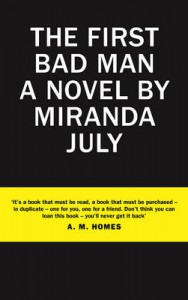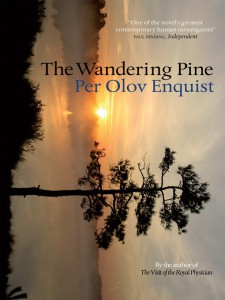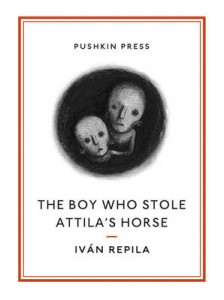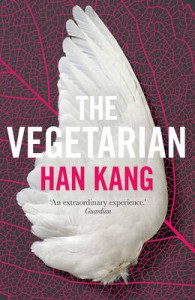It’s been a year of ups and downs, really: I relaunched the blog with a new focus and name, and later with its own domain; and I feel I’ve got closer to what I wanted to achieve. However, especially in the latter part of this year, I haven’t had as much time as I expected for reading and blogging, so some of my plans are being put back into 2016 instead. I would like to dig more deeply into why I respond to certain books in the way I do (I also have plans for a series of posts going back to books I read in my pre-blogging days, to trace where the reader I am now came from). I’d still like to focus in more on the kinds of books that speak to me most, and explore older works… Well, more on that later.
For now, here are my twelve favourites from all the books I read in 2015. I’m especially struck that I have my most globally diverse list to date: authors from ten different countries; books originally written in six different languages; and, for the first time, translations predominate. More than that, though, I look over this list and think: yes, these books – in all their different ways – are what I like to read. That’s what this is all about.
Enough preamble: on to the books. The countdown is a bit of fun, but the books are all well worth your time.
 12. Miranda July, The First Bad Man (2015)
12. Miranda July, The First Bad Man (2015)
I started off thinking I knew what sort of novel this was going to be: offbeat tone, middle-aged, middle-class American protagonist… I have the measure of this, I thought. Well, I was wrong. There is a good deal of eccentricity and artifice in July’s tale of a fortysomething woman whose careful household routine is disrupted by the arrival of her employers’ twenty-year-old daughter. But it is shown to be a front and a defence mechanism – and when July breaks through her characters’ façades, her novel cuts sharply.
[My review] – [Foyles affiliate link]
11. Ivan Vladislavić, The Folly (1993)
A story of how easy, and dangerous, it can be to fall for someone else’s dream. The husband of a suburban couple is captivated by a stranger who moves on to the neighbouring plot and announces that he’s going to build a new house. Soon the husband is doing all the hard work for the newcomer while the ‘house’ remains little more than an idea – but what a powerful idea. Vladislavić’s first novel is equally delicious and disturbing, reminding one of the darker shadows that lie behind its playful tone.
[My review] – [Foyles affiliate link]
10. Sunny Singh, Hotel Arcadia (2015)
A novel about the distance between image and reality, set in the heightened environment of a hotel under attack from terrorists. Singh maintains a tight focus on two characters – a war photographer who roams the corridors, and the hotel employee who uses CCTV to help her evade capture – and never leaves the building, except in flashback. But that very stylised approach helps give Hotel Arcadia its power, as reality becomes concentrated, and a few days can hold a lifetime.
[My review] – [Foyles affiliate link]
9. Dan Rhodes, When the Professor Got Stuck in the Snow (2014)
Hands down, the funniest book I have read in a very long time. You can sum it up in a single line – Richard Dawkins forced to stay in a village at the vicar’s house – but you can’t capture its essence without reading. The mixture of broad, cartoonish humour and sharp satire (aimed in several directions) lulls you into a false sense of security… Then comes the moment – as in all of Rhodes’ fiction that I’ve read – where you see behind the curtain, and that is really why I love this novel so much.
[My review] – [Foyles affiliate link]
8. Iván Repila, The Boy Who Stole Attila’s Horse (2013)
Translated from the Spanish by Sophie Hughes (2015)
A small, hallucinatory jewel of a book in which two boys are trapped at the bottom of a well and trying to get out. This novel plays out in my mind’s eye as a scratchy animated film, each chapter-scene limned in a slightly different colour. Repila constantly changes the imaginative space of the well through his style and imagery; and, as with The Folly above, there’s a grim reality apparent beneath the surface of metaphor.
[My review] – [Foyles affiliate link]
7. Hiromi Kawakami, Manazuru (2006)
Translated from the Japanese by Michael Emmerich (2010)
If you’d told me last year that I would have a Kawakami novel on my favourites list this year, I may well not have believed you. I had read The Briefcase/Strange Weather in Tokyo twice and scarcely felt close to unlocking it. But Manazuru is a different kind of book, one I took to straight away: a combination of hazily blurred realities and pin-sharp emotional detail, as a woman retreats to a seaside town in search of something – possibly her missing husband, possibly herself. A third read of The Briefcase/Strange Weather is clearly in order…
[My review] – [Publisher link]
6. Jenny Erpenbeck, The End of Days (2012)
Translated from the German by Susan Bernofsky (2014)
A worthy winner of what turned out to be the final Independent Foreign Fiction Prize. The first page may be the single most potent scene that I’ve read all year. In each of the five main sections, Erpenbeck’s protagonist dies at a different point in time, which changes the meaning of her life and death, and the way she interacts with history. The End of Days sets an individual life against the sweep of the twentieth century, to quite marvellous effect.
[My review] – [Foyles affiliate link]
5, Paulette Jonguitud, Mildew (2010)
Translated from the Spanish by the author (2015)
The protagonist of this short novel finds mildew growing over her body, and Jonguitud’s writing creeps through the reader in the same way. The narrator merges together fallible memory, physical space, and possibly faulty perception, to the point that there’s no meaningful boundary between the real and the imaginary to begin. We are invited into this seamless imaginative space, and can only hold on as the narrator tries to keep control of her own story.
[My review] – [Foyles affiliate link]
 4. Per Olov Enquist, The Wandering Pine (2008)
4. Per Olov Enquist, The Wandering Pine (2008)
Translated from the Swedish by Deborah Bragan-Turner (2015)
Of all the books on this list, Enquist’s was the one that caught me most unawares, in that I wasn’t prepared for how deeply it would affect me. The Wandering Pine is based on its author’s life, combining closeness to its subject with a distance and mystery that comes from the oblique fictional framing. It’s a novel that explores what explores what it is to engage with the world through writing, not to mention one of the most powerful depictions of childhood that I have read.
[My review] – [Foyles affiliate link]
3. Lucy Wood, Weathering (2015)
Three years after the wonderful Diving Belles, Wood goes from strength to strength. In someone else’s hands, this could have been a run-of-the-mill tale of a woman returning to her rural childhood home. In Wood’s work, all lines between metaphor, place and action are erased; here, she situates her characters in a raw, unknowable landscape that haunts them as they haunt it. This author is carving out a path all her own, and I am excited to see where she will go.
[My review] – [Foyles affiliate link]
2. Yuri Herrera, Signs Preceding the End of the World (2009)
Translated from the Spanish by Lisa Dillman (2015)
A woman travels from Mexico to the US with a message for her brother, in this tale where borders of all kinds are crossed or dissolved: borders of geography, language, culture. There’s a fuzzy, mutable quality to both the language and the space of this novel, where a journey to another country reads like a metaphorical (or literal!) descent into the underworld. I’m still astonished at how much ground Herrera covers in so small a space.
[My review] – [Foyles affiliate link]
1. Han Kang, The Vegetarian (2007)
Translated from the Korean by Deborah Smith (2015)
This was the very first book I read in 2015, and nothing since has ever quite supplanted it. Three novellas, linked by the character of a woman who decides to give up eating meat, eventually refusing all food, for reasons we are never fully allowed to comprehend. We only view the main character through the eyes of those around her, as Han explores the ramifications of someone stepping outside social norms, and asks who really makes the self. The Vegetarian is an extraordinary experience.
[My review] – [Foyles affiliate link]
And if you want more favourites, here are my previous lists: 2014; 2013; 2012; 2011; 2010; and 2009.



 I’ve been reading Marry Me, Dan Rhodes’s new collection of flash fiction on the theme of marriage. This being Rhodes, all is not exactly sweetness and light: in many of these stories, a male narrator is treated shabbily by his female partner – or occasionally he’s the one behaving shabbily himself – in absurd and darkly amusing ways.
I’ve been reading Marry Me, Dan Rhodes’s new collection of flash fiction on the theme of marriage. This being Rhodes, all is not exactly sweetness and light: in many of these stories, a male narrator is treated shabbily by his female partner – or occasionally he’s the one behaving shabbily himself – in absurd and darkly amusing ways. Viola di Grado,
Viola di Grado, 
 Priya Basil,
Priya Basil, 







 My introduction to Dan Rhodes was his previous novel, 2007’s Gold, which I
My introduction to Dan Rhodes was his previous novel, 2007’s Gold, which I
Recent Comments